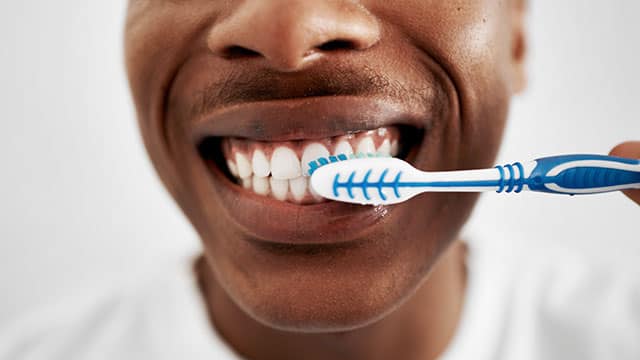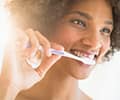What are the different toothbrush bristle types?
There are typically three kinds of soft-bristle toothbrushes available in stores, extra-soft, soft and medium-soft. Hard-bristled toothbrushes—often called firm-bristles toothbrushes on the packaging—are not commonly found in stores because most dental professionals recommend toothbrushes with soft bristles. They especially recommend soft-bristle toothbrushes if you have sensitive teeth or signs of erosion. There are so many bristle options for toothbrushes, including:
- Bristle firmness
- The angle of the bristles
- Number of layers of bristles
Which toothbrush is best: soft-bristle or hard-bristle toothbrush?
Dental professionals recommend soft-bristle toothbrushes because too much pressure or overzealous brushing can negatively impact the enamel and gums. The American Dental Association (ADA) recommends soft-bristle toothbrushes with angled or multi-layer bristles to ensure an excellent clean without harming your teeth. If you feel like your toothbrush bristles are too soft, you can try the following options:
- Angled bristles to get into nooks and crannies
- Electric toothbrush for extra oomph
- Multiple layered bristles
Powered toothbrushes tend to come with heads with soft bristles because the rotation and vibration tend to add extra pressure to your teeth already, without needed firm bristles.
How to choose a soft or hard-bristled toothbrush
You should choose the type of toothbrush that will be easy and comfortable to use at least twice a day. There are many different options between manual and electric toothbrushes. However, dentists' consensus is to choose soft-bristled toothbrushes, especially if you tend to push harder against your teeth. More pressure does not equal cleaner teeth, and in fact, can cause gum loss, which can contribute to tooth sensitivity. It may start to damage the enamel and tissues around your teeth.
If you feel like you're not getting a thorough clean with your toothbrush, talk to your dental hygienist or dentist about which toothbrush is best for you.
This article is intended to promote understanding of and knowledge about general oral health topics. It is not intended to be a substitute for professional advice, diagnosis or treatment. Always seek the advice of your dentist or other qualified healthcare provider with any questions you may have regarding a medical condition or treatment.
ORAL HEALTH QUIZ
What's behind your smile?
Take our Oral Health assessment to get the most from your oral care routine
ORAL HEALTH QUIZ
What's behind your smile?
Take our Oral Health assessment to get the most from your oral care routine
Join Us
Get the best of your oral health routine and take it to the next level with expert advice, recommendations, products and solutions and special offers.
Join Us
Get the best of your oral health routine and take it to the next level with expert advice, recommendations, products and solutions and special offers.












.png)


